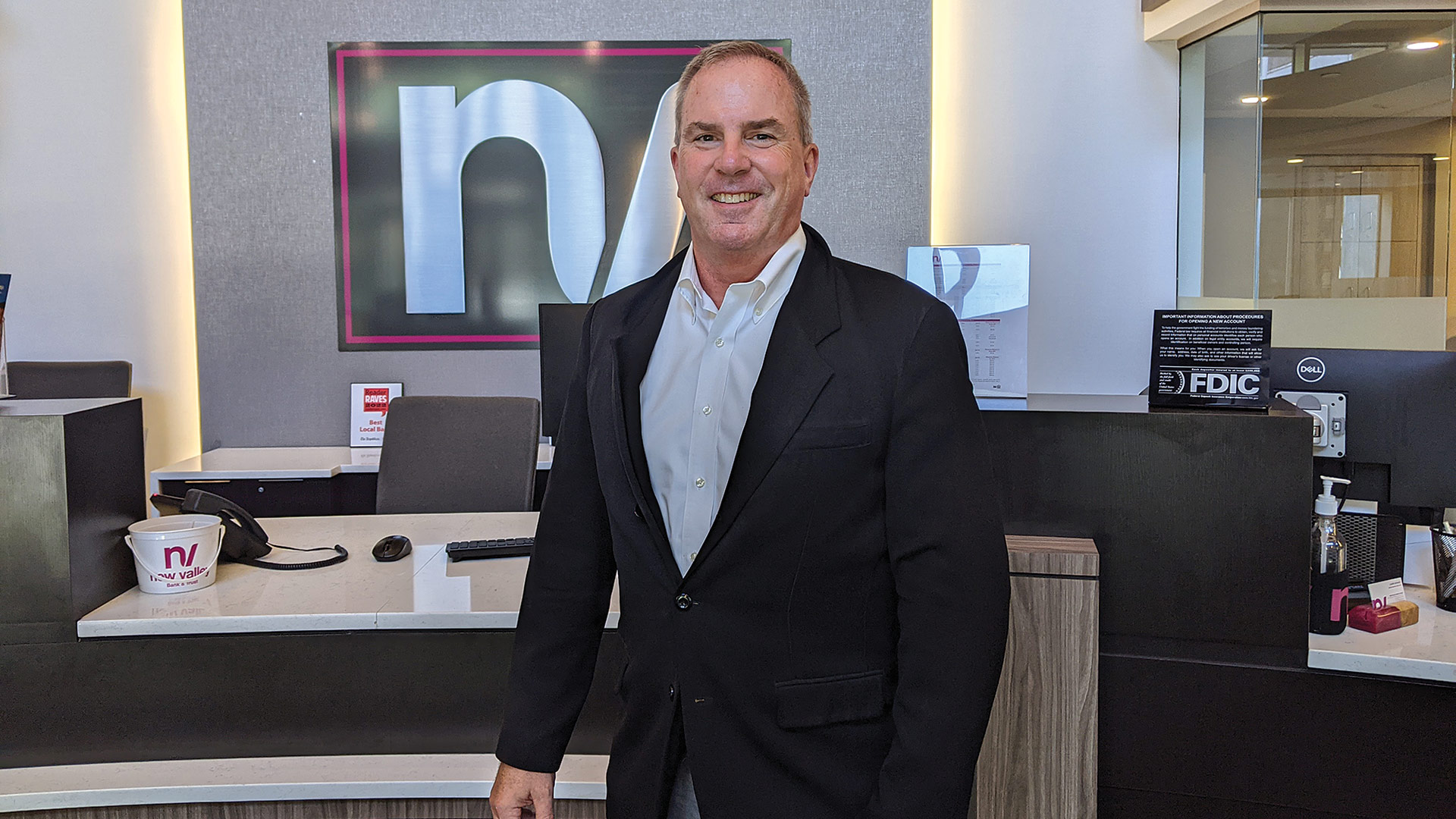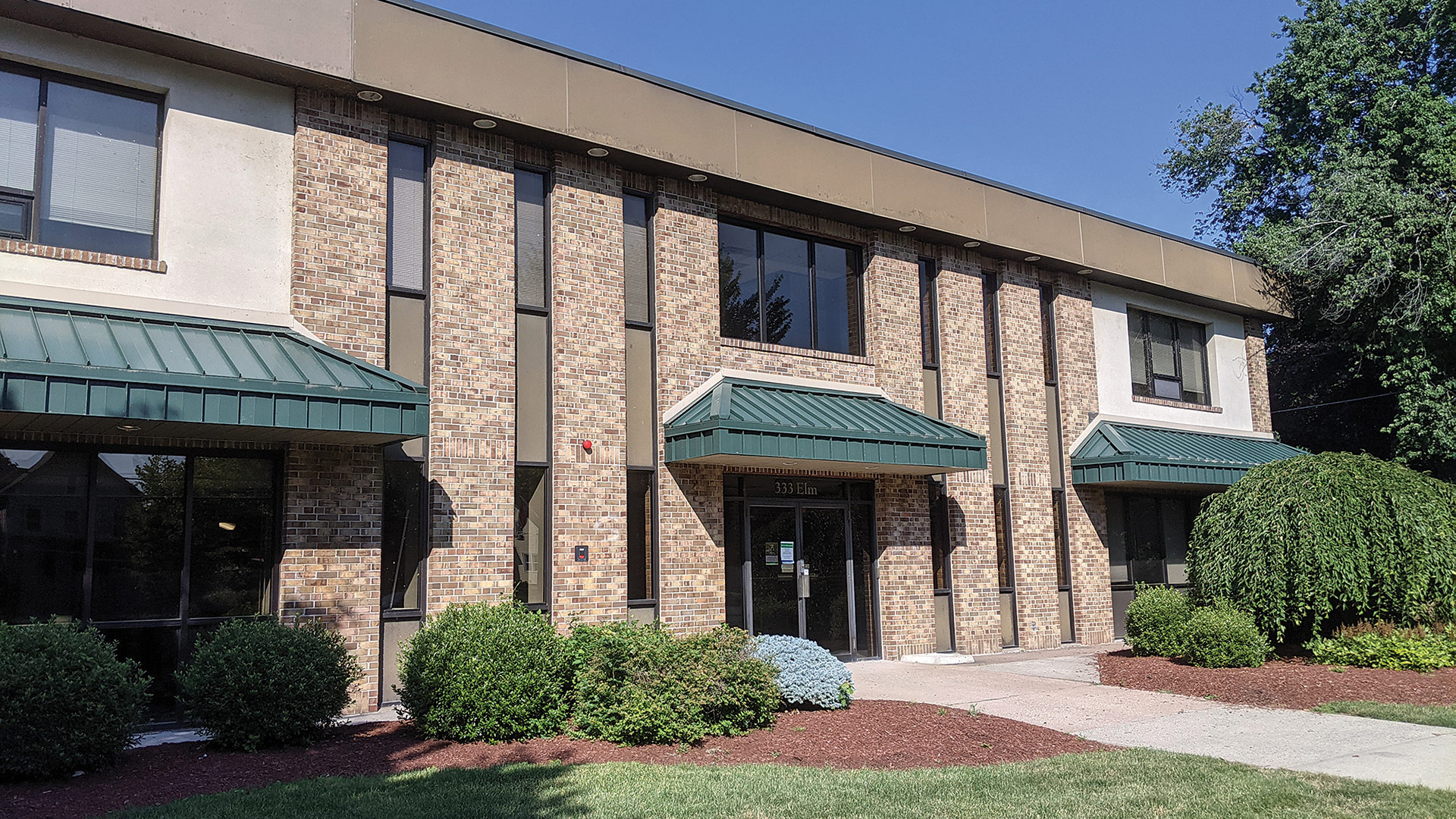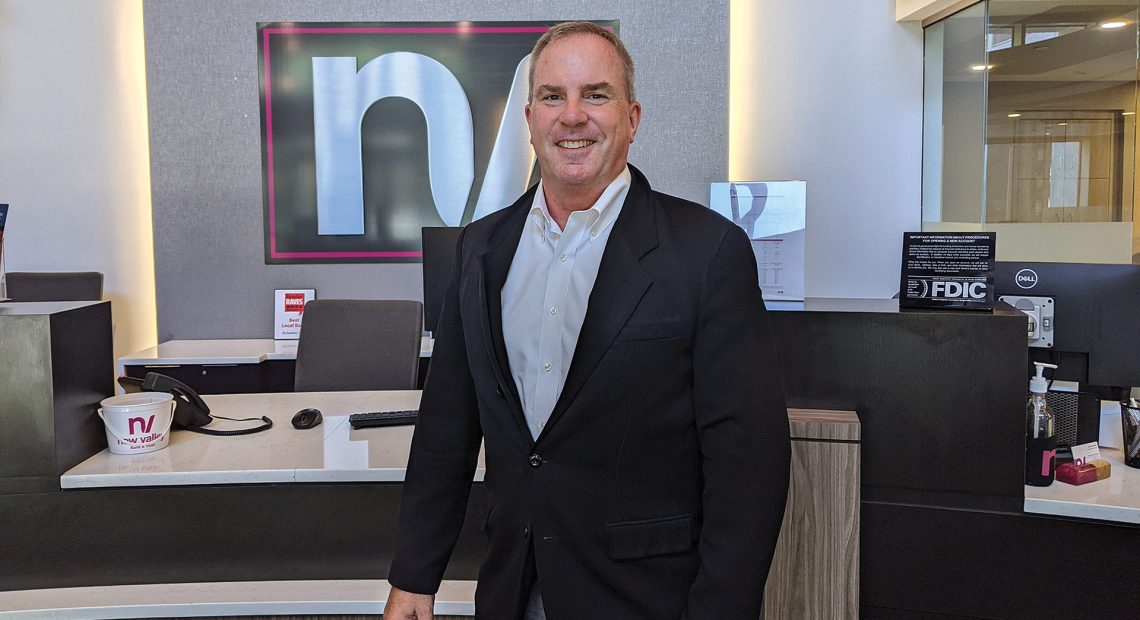Making Contact

Jeff Sullivan says New Valley came into the market wanting to cater to small and medium-sized businesses, and that philosophy has served the bank well.
When BusinessWest spoke to Jeff Sullivan in late 2019, about six months after New Valley Bank & Trust opened in downtown Springfield — the first Springfield-based bank to open in more than a decade — he talked about focusing on smaller commercial loans than larger banks prefer to take on, and quick turnaround times as well.
The driving philosophy, amid a landscape of ever-larger mergers and acquisitions in banking, was to serve small to medium-sized businesses in a high-touch way they don’t necessarily experience at large institutions.
That philosophy is still true today — and it works, to judge by the growth of New Valley in its first three years, with 35 employees, just under $300 million in assets, and a third branch set to open in West Springfield in September (more on that later).
“Some of our bigger competitors, just as a function of their size, have to do larger deals. It’s just a math equation; they’ve got to feed a bigger engine,” Sullivan said during our recent visit, noting that many large banks don’t want to focus on deals under seven figures.
“But all those $100,000 and $500,000 relationships really mean a lot to us,” he went on. “We like hitting singles, and we think we do it well; we think that’s an overlooked part of the market.”
While many large banks have long assumed that non-bank lenders, like LendingClub and Kabbage, would grab significant market share in the small-business community, Sullivan said, people still value local banking relationships.
“They say, ‘I know these people, I trust them, and if I have a really bad year or something bad happens to my business, I know somebody at that bank I can call to help me.’ If you’re dealing with an 800 number of a Wall Street bank or a Silicon Valley fintech firm, you’re probably not going to get that level of service.”
And in granting that kind of quick, personal service, Sullivan said the bank is growing the economy by encouraging the region’s extensive small-business ecosystem.
“We just continue to execute on our plan. We have plenty of liquidity, plenty of capital. We can continue to grow for a couple more years with the framework that we have.”
“We serve the entrepreneurs, people with energy and a lot of enthusiasm and optimism by nature. A lot of really smart, enthusiastic people are living here who have good ideas, and turning those good ideas into real businesses is an incredible challenge,” he said. “So, I think our customer base is inherently a little more optimistic about the future and thinking about growth, and it’s great to work with people like that.”
Just past its three-year anniversary — the time when the startup phase is over and regulators “take some of the handcuffs off,” Sullivan said — New Valley is slightly ahead of the pace of its original business plan. Deposit growth is certainly ahead of schedule, but that’s true of all banks after the federal government poured trillions of stimulus dollars into the economy between mid-2000 and early 2021.
But loan growth is on target at New Valley as well, with about $175 million in outstanding loans, about $25 million of that residential and the rest commercial.
“The pipeline is good,” he said. “We’re in a time now when rates have gone up, there’s a lot of talk about a recession, and you hope it’s not a self-fulfilling prophecy, where if enough people talk about a recession, they’ll kind of speak it into existence. We’re cautious about the end of this year and going into 2023, but our pipeline is as big as it’s been. We’re having really solid production months, with lots of new customers signing up with us every month.”

New Valley’s third branch, at 333 Elm St. in West Springfield, is expected to open in September.
As a result, he expects that outstanding-loan figure to top $200 million by year’s end, and maybe by the third quarter. “We just continue to execute on our plan. We have plenty of liquidity, plenty of capital. We can continue to grow for a couple more years with the framework that we have.”
Over the River
While the last bank launched in Springfield before New Valley, NUVO Bank (since acquired by Community Bank), focused on a mostly digital banking model, New Valley wanted to stress more of a brick-and-mortar foundation. It currently has two branches in Springfield, both downtown and on Wilbraham Road in Sixteen Acres.
A third branch is expected to open in September on a former Holyoke Credit Union site at 333 Elm St. in downtown West Springfield.
“We evaluated it and thought it was a really good opportunity,” Sullivan said. “There’s some old-school thinking that people don’t like crossing the river; they don’t like to be forced to go to downtown Springfield. We had a steady chorus of people saying, ‘could you please open something on the west side of the river?’ So we were pretty sure our next branch would be on the west side of the river, but we weren’t sure exactly where. This opportunity just kind of dropped in our lap.”
One advantage of the new office will be drive-up convenience, which downtown Springfield customers don’t have. But there are other reasons customers value conveniently located branches, even at a time when adoption of mobile and online banking has soared.
“There have been barriers getting to parity. But as those barriers disappear, we’re seeing a swell of Latino and African-American businesses that are starting up — really smart, talented people who are choosing to move to this area because they feel like there are resources here.”
“People say bank branches are going to go away at some point and go fully electronic. But I think there is still a safety blanket when people know there’s a bank branch close to their location, and when they go in for some of the important transactions, like opening accounts or applying for a loan, or when they really need advice, they can show up in person.
“That builds confidence,” he added. “They probably go to our branches very infrequently, unless they’re in some kind of cash business where they have to go all the time. But I think people want to know there’s somebody that they trust within a relatively short drive of where they are, and they can lean on that person if they need to.”
The team at New Valley makes a point of engaging with customers, he added. “If they’ve got any questions, we try to give them advice as best we can. And people are just very appreciative of that. We’re so small that, if I get a call and it happens to be about a customer-service issue, I can run right upstairs and take care of it pretty much on the spot.”
That was especially true during the pandemic, when community-focused banks and credit unions helped customers navigate some truly trying times, with Paycheck Protection Program (PPP) loans and in other ways.
“There’s nothing better than somebody calls a year later and says, ‘I may not have told you at the time, but I was really struggling, and you guys really helped me out.’ That’s always great to hear.”
The pandemic also saw banks expand their digital capabilities as customers embraced those technologies like never before.
“Our industry was behind the curve in terms of adoption of technology in a lot of ways,” Sullivan said. “But since 2020, everybody knows how to use their phone to do their banking transactions. Most people know how to make a deposit with their mobile device. People are more savvy. Banks, as a result of that, are trying to automate more and more their processes.
“With the PPP loans, people could apply online and didn’t have to talk to a human being; they could sign up electronically, and we could get everything done remotely — because we had to do it remotely,” he went on. “Now, we’ve taken those best practices and rolled them into normal post-pandemic business. We want people to be able to go online with a few clicks and apply for a loan, and we can deliver the documents electronically.”
At New Valley — and at most other banks, it seems — there’s certainly a place for both high-tech and in-person services, and neither are fading away.
“It’s not that we don’t want to have those in-person interactions with people,” he added, “but sometimes it’s just a whole lot more convenient to be able to email the documents to somebody, they sign it — whether at 7 at night or 7 in the morning — and it’s back in our inbox the next day, and we take care of it.”
Long-term Partners
Sullivan was quick to tout other aspects of the New Valley task and spending our dollars wisely, and that opens up opportunities for us. While we’re small, we’re not inefficient in terms of our overhead compared to the overhead of a bigger bank. So we have the ability to offer more products to people.”
Meanwhile, the bank’s lenders have met what Sullivan called “a steady stream of people” bringing experience and good business plans to the table, in many cases, but needing help getting to the next level.
“A lot of them are walking in the door with so much growth in front of them, and their biggest question is how to manage it. They’re not asking, ‘how do I start from zero?’ They started from zero, but they’ve gotten to a certain point, and now the hockey stick is going straight up, and the question is how to manage it. ‘Do I have the right management team? Do I have enough employees? Do I have the ability to buy materials?’ Those are good problems to have, but they’re still problems; they’re still challenges.”
Sullivan is gratified that many small-business owners dealing with those challenges locally hail from the Latino and African-American communities, which have been historically underserved by entrepreneurship resources — but that’s changing in Greater Springfield.
“There have been barriers getting to parity. But as those barriers disappear, we’re seeing a swell of Latino and African-American businesses that are starting up — really smart, talented people who are choosing to move to this area because they feel like there are resources here.
“That’s a big part of our business for the future as well, just playing whatever small role we can play in wealth creation for those families, helping them to build wealth for future generations,” Sullivan added. “And hopefully we can hit those singles, and they turn into doubles and triples and the occasional home run, and hopefully we’re with those families, building multi-generational relationships, for a long, long time.”
Joseph Bednar can be reached at [email protected]







